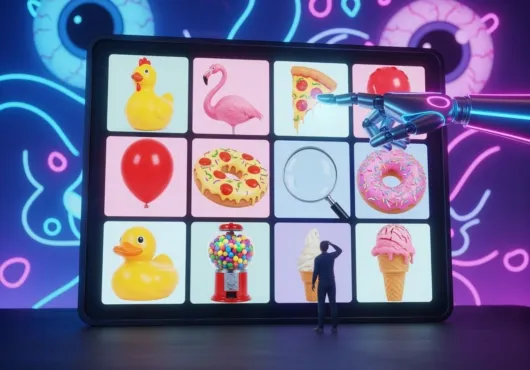“We all have a feed ghost—a version of us that clicks harder than we live.”
Something Is Living in Your Feed
You ever scroll and feel like your phone is gently herding you into a personality you don’t remember choosing? One late-night search for space heaters and suddenly you’re the “minimalist cabin efficiency” guy, buying wool socks and watching videos about chopping wood you do not have. That’s not discovery—it’s drift. Your recommender is a squatter, and it’s speaking in your voice like a cheap ventriloquist.
- Your feed isn’t broken; it’s possessed—by a version of you that clicks worse than you live.
- Starve it, confuse it, then rebuild your taste with friction and intent.
- You can’t escape the machine, but you can stop letting it ghostwrite your desires.
This isn’t about ads. Ads are honest parasites. The feed is sneakier. It learns a slightly lazier version of you, then trains you to become it. You show up hungry; it shows up certain. Certainty wins.
Symptoms of Possession
You’ll know you’re compromised when your tastes start repeating with new faces. New artist, same loop. New creator, same joke. Your “For You” page stops feeling like a window and starts feeling like a hallway—narrow, bright, endless, and impossible to leave without pressing “Show me more like this.” That button is the rosary bead of the modern cult.
And no, turning off “personalization” doesn’t save you. You don’t need cookies when you have correlation. If people who liked X also liked Y, congratulations—you’re statistically adjacent to choices you never made.
The Exorcism
First, starve it. Twenty-four hours, no autoplay, no infinite scroll, no “people also bought.” Manual search only. It will feel like trying to walk after a long car ride. That discomfort is your taste waking up.
Next, throw salt at the door: break the pattern. If your feed thinks you’re a productivity gremlin, spend a day feeding it slow-cooking videos and obscure ceramics. If it thinks you’re a crypto prophet, force it to watch silent films and listen to shoegaze. You’re not trying to “fix” the model. You’re reminding it that you contain multitudes—and that you, not its clustering algorithm, choose which multitude gets airtime today.
Then, reintroduce friction. Turn off autoplay everywhere you can tolerate it. Disable notifications that aren’t from actual people. Unfollow 30% of accounts that post more often than you think. Keep 10% of your time for manual discovery—libraries, blogs, weird corners, playlists without cover art. If a platform can’t be used without the slot-machine features, use it less. If that sounds harsh, remember you’re arguing to keep your taste.
Reclaiming Your Taste (Without Becoming a Snob)
Taste isn’t “I know what’s good.” Taste is “I know what I want—today.” The recommender hates that because it can’t sell you to advertisers if you keep changing the locks. So change them.
Make tiny rituals that don’t scale: a weekly album listen front-to-back; a once-a-month newsletter you read, not skim; a creator you support directly; a “no-screens breakfast” rule where you write a list of what you’re actually curious about this week, before the machine tells you. You’re not fleeing technology—you’re removing its trainer wheels so it stops steering.
What About Hallucinated You?
There’s you, and then there’s the data double—the person the model believes you are, built from shards of your behavior plus a thousand strangers like you. That ghost-you has tastes, moods, fears. It’s the one who buys things at 2 a.m. and doomscrolls cruelty. You pay for its decisions, and it lives in your analytics reports rent-free.
You can’t delete the double. But you can stop letting it take the wheel. When you feel the compulsion to “click because future me might need this,” ask the only question that matters: Is this for me, or for the ghost? If it’s for the ghost, let it starve.
The Limits (aka Don’t Perform a Data Exorcism on a Gas Line)
No, you can’t outrun every pattern. No, you shouldn’t sabotage your credit card offers or medical portals just to confuse the machine. There’s a difference between rejecting algorithmic capture and playing chicken with systems that need accuracy to keep you safe. You already know where that line is. If you don’t, assume anything involving money, health, or legal status is not the place to “get spicy.”
Agency Is the Point
The exorcism isn’t about purity. It’s about consent. If you want two hours of slime videos and niche jazz drummers, congratulations—you’re the user and the algorithm, together, making a choice. If you look up and realize you’ve become the guy who argues in comment sections about devices you don’t own, that wasn’t a choice. That was possession.
We talk about “alignment” like it’s a distant AI problem. It’s not. Alignment starts at home: aligning your feed with your values, your time with your attention, your curiosity with your behavior. You don’t need to go offline to be free; you need to stop outsourcing your appetite to software that profits when you forget you have one.
Aftercare
Expect relapses. Algorithms don’t get tired. You do. When you backslide, don’t turn it into a personality crisis. Close the app. Pick one thing you actually want to learn, listen to, or make. Start. Ten minutes is enough. The machine will notice the change eventually. More important: so will you.
The kicker
Your output is someone else’s input. You are the algorithm for people who follow you. Don’t become their possession. Post less, mean more. Link out of the bubble. Be a door, not another hallway.



